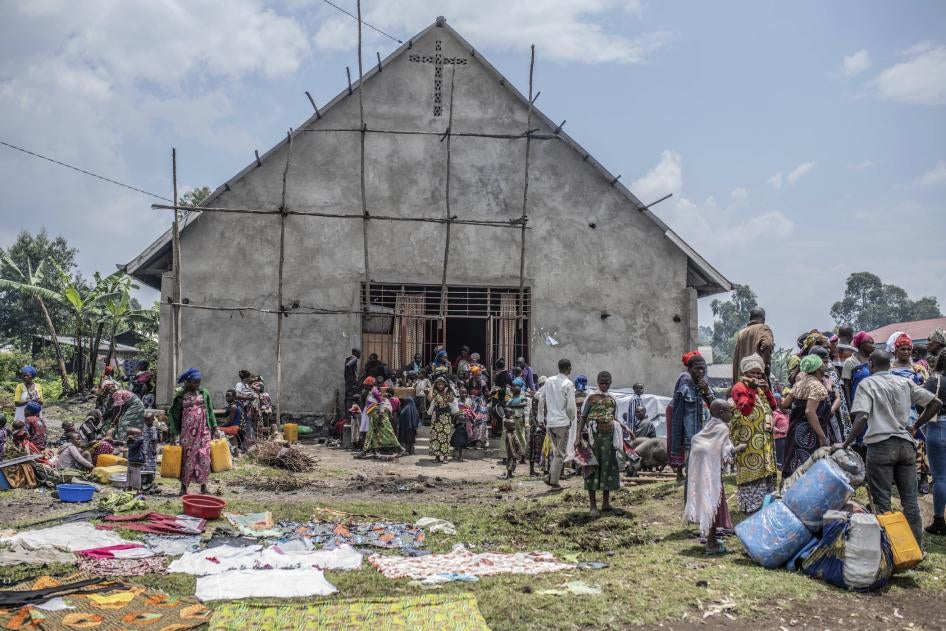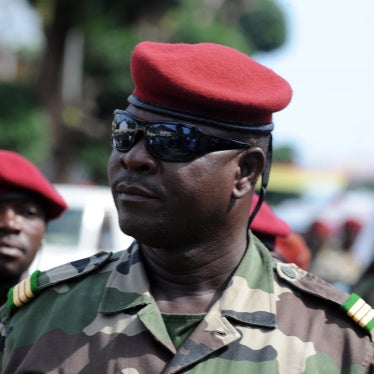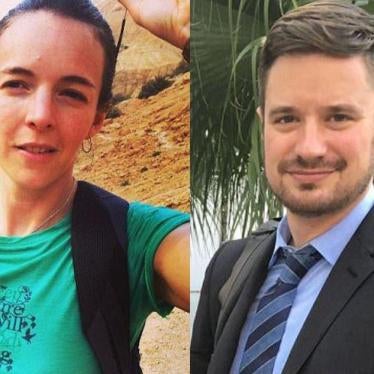The events of 2022 brought renewed attention and support for accountability for serious international crimes. Russia’s full-scale invasion of Ukraine brought images of mass burial sites and bombed-out cities back on the front pages, and the far-reaching impact of the conflict triggered a strong response from the international community. At the same time, it has put into sharp focus unevenness and double-standards in access to justice for the victims of these crimes.
A review of some of trends from the past year makes clear that securing victims’ access to justice worldwide means governments need to strengthen the international justice ecosystem as a whole.
Key Challenges and Opportunities
With the expansion of the war in Ukraine in February 2022, a number of governments pursued various justice efforts. These have included support for domestic investigations and prosecutions in Ukraine, a referral of the situation to the International Criminal Court (ICC) in the Hague, and the establishment of a United Nations-mandated commission of inquiry. Judicial officials in several countries opened investigations under the principle of universal jurisdiction, which allows domestic authorities to pursue prosecutions no matter where the crimes were committed, and regardless of the nationality of the suspects or their victims.
How these efforts will ultimately work together to provide impartial and credible justice for Ukraine is unclear. But at least on paper, this timely and multifaceted response shows that the international community can capably respond in the face of mass atrocities. This has been possible because of concerted efforts by governments, nongovernmental groups, and others to build out various accountability avenues over the past 30 years. The establishment of the ICC is an obvious example. Another is the European Union Genocide Network, formed in 2002 under the auspices of Eurojust, the EU's judicial cooperation agency, and mandated to support coordination and cooperation among national authorities in relation to serious crimes.
At the same time, the Ukraine response exposes the more fundamental shortcomings of international justice efforts, in which victims’ access to justice often depends on political calculations.
In early March 2022, an unprecedented number of mostly European ICC member countries referred the situation in Ukraine to the court’s prosecutor, Karim Khan, to open an investigation. These governments have been vocal in their support for the investigation from the start. Yet a year earlier, when the previous ICC prosecutor, Fatou Bensouda, opened a Palestine investigation, there was deafening silence from ICC member countries, and at least two openly opposed the investigation. This was despite the grave nature of the many violations and the pervasive climate of impunity that made the ICC’s scrutiny of the situation necessary.
The United States has been among the staunchest supporters of accountability for serious crimes committed in Ukraine since Russia’s invasion. This has included some unexpected support for the potential role of the ICC that has led to several recent legislative changes, including to allow more US cooperation with the ICC’s Ukraine investigation. The US Congress also adopted the Justice for Victims of War Crimes Act, closing an important gap in US law that could increase the likelihood of bringing war crimes suspects living abroad to justice in US courts. Yet the US maintains its objection to ICC investigations that could implicate US nationals or those of allied non-ICC member countries.
In addition to politically sensitive situations that directly implicate powerful governments and their allies, unevenness in justice responses is also apparent where prolonged situations of conflict or violence that may seem intractable do not receive the necessary attention. The escalating fighting and large-scale attacks on civilians in eastern Democratic Republic of Congo is an example of a situation in which the international community has remained largely silent when it comes to accountability. The ongoing violence has been fueled at least in part by the persistent impunity gap, with recent atrocities allegedly committed by many of the same actors implicated in past abuses.
To be sure, victims’ access to justice also depends on capacity within the international justice system. There are more grave crimes than the system can address.
But the mobilization around Ukraine demonstrates that where there is a will, there is a way. The absence of similar responses to other situations not only deprives victims of access to justice, but also threatens its legitimacy when justice is delivered. Unevenness in governments’ justice responses is particularly damaging if it replicates power dynamics and discrimination stemming from a colonial past. This can alienate a large number of countries that do not feel equally valued within the international justice system, undermining its broader legitimacy.
This unevenness also risks creating a hierarchy of victimization. Some governments seem alert to this risk. At the most recent annual ICC meeting, the Africa group, together with a number of other countries from different regions, succeeded in adding language to the yearly ICC Assembly of States Parties’ “Omnibus” resolution expressing “support for the consistent implementation of the Court’s mandate across the situations and cases under its jurisdiction in the interests of justice and the victims’ right of access to justice” (emphasis added).
And in a statement issued at a July 2022 high-level conference on accountability in Ukraine, two coalitions of Ukrainian civil society organizations stressed the need “to avoid any perception of a two-tier global accountability system in which some victims are more deserving than others.”
The Way Forward
A double standard in victims’ access to justice should not be accepted as inevitable. Building on the current momentum for accountability for grave crimes and the lessons learned from the response to Ukraine, governments can take concrete actions to strengthen the global architecture of international justice.
First, the system needs more capacity to further enable the delivery of justice. Governments should provide adequate financial and political support, as well as cooperation, to judicial entities – whether international, domestic, or hybrid – that tackle grave international crimes. The effectiveness of these bodies is severely hampered, and their potential impact hollowed out, when they do not have sufficient resources. In December, ICC member countries approved an increase to the court’s annual budget, which barely covers costs associated with inflation and is far below what the court had requested. This prevents the ICC from acting wherever it is needed to do so and avoid overly selective approaches to its mandate.
Second, expand capacity by expanding ICC membership. Currently, 123 out of 193 UN member states are parties to the ICC’s Rome Statute. However, dozens of countries, including major powers, have not ratified the treaty, significantly limiting the ICC’s reach. It is essential for ICC members to continue engaging with those countries to convince them to join the court.
Third, strong domestic legal and institutional frameworks are crucial to strengthening the international justice ecosystem as they enable authorities to effectively investigate and prosecute serious crimes. This should include implementing the ICC treaty into national law, incorporating serious international crimes into domestic penal codes, and setting up units within police and prosecutorial services dedicated to addressing serious crimes.
Progress at the national level is possible. Over the past year, there have been positive steps for justice for international crimes at the domestic level in the United States, with the legislative reforms previously mentioned; in Colombia, with progress in the work of the Special Jurisdiction for Peace, particularly around hostage-taking committed by the Revolutionary Armed Forces of Colombia (FARC) guerrillas and the army’s “false positive” cases; and in Guinea, with the opening of a landmark trial for the country’s 2009 stadium massacre.
The principle of universal jurisdiction has proven to be a critical international justice tool. In the past few years, it has allowed governments to address some of the asymmetry in international justice by creating new – albeit limited – paths to justice where other avenues are blocked. For example, in light of the inability of the UN Security Council to refer the situation of Syria to the ICC given Russia’s veto, investigations and prosecutions in third countries are currently the only option for individual criminal justice for Syrian victims and survivors.
The landmark first trial for state-sponsored torture in Syria, concluded last year in the German city of Koblenz, is a powerful example of national judicial authorities acting based on strong domestic legislation. Another recent illustration is the conviction by a French Court of a former Liberian rebel leader for crimes committed during the country’s first civil war. Despite the success of the case, there are legal barriers that still limit French judicial officials’ ability to address crimes committed abroad and, as a consequence, shrink victims’ access to justice. The French government and others in Europe with similar restrictions should prioritize making the legislative changes necessary to remove them.
Finally, governments should pursue and support accountability for grave crimes regardless of where they take place and commit to not limit or obstruct investigations when they implicate their nationals or those of allies. This includes the need for UN Security Council permanent members to refrain from using their veto in situations of mass atrocities.
Governments should support ongoing initiatives to achieve that goal. For example, in August 2015, France and Mexico initiated a political declaration to secure voluntary restraint on the use of the veto by permanent Security Council members when faced with mass atrocities. This would facilitate for example the referral of situations involving non-ICC member countries to the court. The declaration has been signed by over 100 states.
In December 2015, a group of states working to improve the working methods of the Security Council submitted a Code of Conduct regarding Security Council action against genocide, crimes against humanity or war crimes to the UN secretary-general. The Code, which includes a pledge to “not vote against a credible draft resolution before the Security Council on timely and decisive action to end the commission of genocide, crimes against humanity or war crimes, or to prevent such crimes,” has so far been signed by over 120 states.
The various interconnected elements of the international justice ecosystem are powerful tools to pursue victims’ rights to access justice. However, they do not operate in a vacuum and political will can either enable and strengthen or neuter them. Last year taught us what can be done when governments choose the former. Governments should learn this lesson and during 2023 show their determination to take concrete actions to ensure victims’ access to justice everywhere.










